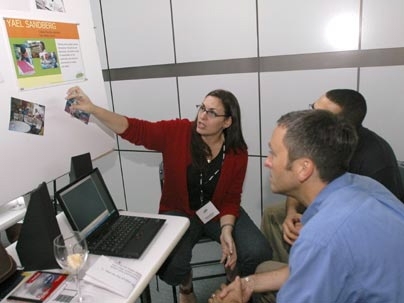They came from all over the globe, but the 19 IDEAS fellows who spent last week at MIT were united in their purpose: to provide children in low-income communities with opportunities to express themselves creatively using technology.
The IDEAS Institute for Innovative Design Experiences After School was held at the MIT Media Lab June 26-July 1. The weeklong conference brought together a diverse group of after-school educators, some affiliated with the Computer Clubhouse network of after-school learning centers, which was co-founded by the Media Lab, and some who work at other after-school programs around the world.
"The idea for the institute came out of a desire to share ideas with other kinds of community technology centers," said Professor Mitchel Resnick, who co-developed the first Computer Clubhouse 12 years ago with the Computer Museum, now part of the Boston Museum of Science. That first, successful Boston-based program has spawned more than 100 clubhouses worldwide.
Projects that come out of the clubhouses are as varied as the students themselves. In one instance, an after-school program in Jordan connected with one in Ireland via computer so students could exchange music they had created. Students were able to learn from one another and gain exposure to a different culture.
As the clubhouses grew, similar programs also gained in popularity. The IDEAS Institute created an opportunity for leaders in these programs to share what has worked in their communities and to brainstorm.
"We were looking for people who were looking for new opportunities in education," said Rachel Garber, project director for the IDEAS Institute, who chose 20 out of 350 applicants to receive the fellowships, which included transportation to MIT, room and board.
The group was looking for a specific kind of applicant: one who had worked in a low-income area, had at least two years of experience and who had a clear passion for his or her work, said Garber. Additionally, she said they were looking for a diverse group of men and women who would implement what they learned in their own technology centers. The rigorous application process included an essay. "We were looking for people who were thoughtful in the process," Garber said.
Though 20 fellows were selected, Oyalegan Olayiwola Morris, a fellow from Nigeria, was unable to attend last week's session because of visa issues. The 19 remaining fellows spent the week sharing information about projects that worked in their communities and ideas for the future.
For example, fellow Luversa Sullivan, coordinator for the Tacoma Computer Clubhouse in Washington, created a model job shadowing and internship program for students at such companies as Microsoft, Intel and Reliacom. And fellow Jennifer Sly, coordinator for the Center for Technology and Science at the Jacob A. Riis Neighborhood Settlement in Queens, N.Y., worked on an "intergenerational photography project." Students interviewed and photographed senior citizens at Riis, the largest public housing project in the country. Students learned not only about digital editing and software, but also about their neighbors.
Fellow Yael Sandberg of São Paulo, Brazil, works on projects that merge art and technology as the director of the Cidade Escola Aprendiz in Brazil. The roughly 600 students and young people in her program have taken on a number of city revitalization projects, she said, learning a bit about art history and creative expression as they worked to clean, paint and dramatically change the appearance of several areas that had become run-down and, in some cases, dangerous.
The students took a year to plan and execute a wall mural bursting with bright colors in an alley that had once been unsafe. "They learned to give another function to the place," Sandberg said.
Sandberg said the opportunity to meet others who share her passion was thrilling. "When I heard about this opportunity to share, it was more than motivation to apply. It was a dream," she said. She said she hopes students who leave her program do so with the sense that life and learning are intertwined--a philosophy she believes MIT exemplifies.
Resnick said he also hopes the 19 fellows will take a piece of MIT home with them. "There is a spirit at MIT that loves learning-through-creating," he said. "We would like to spread that to the rest of the world."






